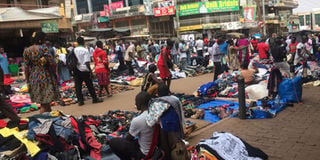City Sunday market hands urban vendors livelihoods

Vendors dealing in second-hand clothes wait for customers on Sunday. Statistics from KCCA’s directorate of Gender, show that the Sunday market accommodates between 800 and 900 vendors Sunday. Photo By RACHEL MABLA
What you need to know:
In 2015, Kampala Capital City Authority (KCCA) launched the Sunday market on Luwum Street to enable ordinary vendors sell their merchandise. Amos Ngwomoya looks at how the initiative has changed the livelihoods of urban vendors.
In 2015, Kampala Capital City Authority (KCCA) launched the Sunday market on Luwum Street to enable ordinary vendors sell their merchandise. Amos Ngwomoya looks at how the initiative has changed the livelihoods of urban vendors.
Consolata Nansamba, 34, is a second hand clothes dealer who operates a mobile business on particular days, a job she has been doing for the last three years.
The single mother of two says she ventured into mobile business because she couldn’t manage to foot rental bills amidst the prevailing tough economic times.
Though she formerly worked as a street vendor, Ms Nansamba narrates that she quit streets after surviving three arrests by the KCCA law enforcement officers.
“I had Shs300,000 which I had saved. In 2015, I decided to operate a mobile market, targeting the Sunday market on Luwum Street and the Kasubi market on Saturday. I am happy that I have been able to sustain a livelihood and my business is growing,” she said.
According to statistics from KCCA’s directorate of Gender, the Sunday market now accommodates between 800 and 900 vendors every Sunday.
Every Sunday, vendors are given leeway to sell their merchandise without any interruptions from the KCCA’s law enforcement team. Merchandise ranges from clothes and foodstuff among others.
Just like Nansamba, other vendors we spoke to about this initiative said the market has helped them complement their little capital.
Daily Monitor further established that although the market was created for vendors as a way of keeping them off streets, some vendors who operate in city gazetted markets also attend it to sell their merchandise.
Hajji Musa Kawooya, who operates a shoes business in Usafi market, says he attends the Sunday Market on Luwum Street to make more sales because the customer turn-up in Usafi is very low.
Usafi market, which sits on six acres of land in Kalintusi-Mengo in Kampala central division was bought by KCCA in 2014 to accommodate street vendors who had poured all over city streets; hence, there was no trade order.
But vendors argue that the market is like a ‘ghost trading in empty space’ because KCCA has allegedly failed to work out modalities for it to attract many customers.
“When KCCA introduced the Sunday market, we seized this opportunity because this was the only way we could supplement our income to enable us manage amidst the tight business competition,” he says.
But Hajji Kawooya says it would have been better if the market was spread across the entire city, and in other city divisions to enable vendors from other divisions benefit.
A spot-check in city markets found out that majority of them are plagued with a host of challenges that have forced out vendors. As such, some of them end up on streets to eke a living.
Kampala minister, Beti Olive Kamya says there is a plan to extend the Sunday market to all the city divisions, adding that one of the mandates of KCCA is to create working spaces for urban dwellers.
But the minister maintains that street vending is illegal, warning that the law enforcement officers will arrest whoever operates on streets.
“The Sunday market has been a success and we plan to extend it to other divisions. However, we are cognisant of the fact that urban dwellers need more working spaces and we are working hard to have more spaces,” she said.
For instance, Ms Kamya says government of through KCCA with support from partners, continues to construct markets in the city to create working spaces for the urban dwellers.
“A three-level structure in Busega is being constructed to provide 2,000 work-spaces to the community in Busega. Work on this market started with $6m (Shs22.8 billion) support from the Arab Bank for Economic Development in Africa (ABDEA) but work has stalled awaiting extra funding.
In July 2013, President Museveni commissioned Wandegeya market, which was constructed at a cost of Shs22b to accommodate more than 1,000 vendors with a loan from the African Development Bank under the Markets and Agricultural Trade Improvement Programme (MATIP).
Currently, there are 51 markets in the city. Of these, 24 are privately owned, 19 are owned and managed by Kampala Capital City Authority (KCCA) and eight are owned by Buganda Land Board.
Some of the public markets managed by KCCA are; Wandegeya, Usafi, Nakawa, Bugolobi and Nateete among others.




